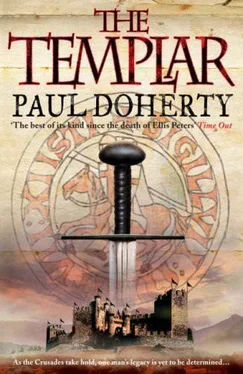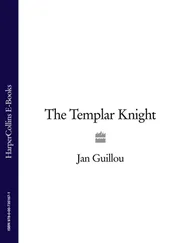P. Doherty - The Templar
Здесь есть возможность читать онлайн «P. Doherty - The Templar» весь текст электронной книги совершенно бесплатно (целиком полную версию без сокращений). В некоторых случаях можно слушать аудио, скачать через торрент в формате fb2 и присутствует краткое содержание. Год выпуска: 2010, ISBN: 2010, Издательство: Minotaur Books, Жанр: Исторические приключения, на английском языке. Описание произведения, (предисловие) а так же отзывы посетителей доступны на портале библиотеки ЛибКат.
- Название:The Templar
- Автор:
- Издательство:Minotaur Books
- Жанр:
- Год:2010
- ISBN:9780312576837
- Рейтинг книги:5 / 5. Голосов: 1
-
Избранное:Добавить в избранное
- Отзывы:
-
Ваша оценка:
- 100
- 1
- 2
- 3
- 4
- 5
The Templar: краткое содержание, описание и аннотация
Предлагаем к чтению аннотацию, описание, краткое содержание или предисловие (зависит от того, что написал сам автор книги «The Templar»). Если вы не нашли необходимую информацию о книге — напишите в комментариях, мы постараемся отыскать её.
The Templar — читать онлайн бесплатно полную книгу (весь текст) целиком
Ниже представлен текст книги, разбитый по страницам. Система сохранения места последней прочитанной страницы, позволяет с удобством читать онлайн бесплатно книгу «The Templar», без необходимости каждый раз заново искать на чём Вы остановились. Поставьте закладку, и сможете в любой момент перейти на страницу, на которой закончили чтение.
Интервал:
Закладка:
Alexius, for all his generosity and advice, viewed the Franks as a farmer would savage dogs whom he’d brought on to his land to drive off wolves: they had to be carefully controlled. The Franks might be dedicated to God’s work, but Alexius was determined they would also do his. He demanded oaths of fealty from the lords and, with various degrees of chicanery, they gave these, promising to hand over any cities taken in return for supplies and military assistance. Alexius swore to put twenty thousand men at their disposal under his chief Turcopole Tacticius, a wily veteran commander of Greek and Turkish parents who’d had his nose bitten off in a fight and replaced it with a false one of gleaming steel. Tacticius also entertained the lords to series of splendid banquets. The Franks, accustomed to draughty, smoke-filled halls adorned with dirty tapestries and warmed by filthy rushes on the floor, were suborned by gleaming hangings, marble walls, luxurious cloths and bathhouses that smelt fragrantly of sandalwood and attar of roses. The Franks mingled with sloe-eyed women garbed in saffron silk, rose and blue linen, with purple cords, tasselled with gold, around their slim waists. Alexius opened his treasuries, distributing gold bezants amongst the captains and copper tartarons amongst their followers. Nevertheless, he walked a dangerous path. When the lords assembled to take their oaths, one of them unceremoniously sat down on the Emperor’s vacated throne and had to be roughly pulled off by his colleagues. Further altercations occurred as some of the leaders openly voiced their suspicions of Alexius. Eventually, however, an agreement was reached, the die was cast; an advance guard would cross the Arm of St George into Anatolia, where Sultan Kilij Arslan hoped to destroy them as he had the hordes of Peter the Hermit. That charismatic former leader of the People’s Army was now a discontented, broken man who had merged the pitiful remnants of his erstwhile horde into what everyone was now calling the Army of God. All Peter could do was mourn that the Holy Spirit had deserted him and that he and his followers had been justly punished for the sins they’d committed.
On her part, Eleanor was determined to have words with Hugh and Godefroi. Once in Anatolia, they would face dangers as great as any in Sclavonia. Accordingly, whenever possible, she questioned Hugh, who remained taciturn until the eve of the Feast of St Athanasius. A banquet had been arranged for the following evening where Hugh hoped to host the leading men of his brotherhood and, once again, enforce the rule, which he had made even more rigorous. On the afternoon beforehand he and Godefroi, accompanied by Theodore, took Eleanor into the city along narrow lanes and alleyways, past the markets and bazaars, the rancid-smelling runnels and busy jetties into the great Augusteon Square: a spacious expanse ablaze with sunlight that struck off the ivory-white marble porticoes and walls all emblazoned with gold, silver and bronze. The square was dominated by a huge statue of Constantine as well as the cavernous entrance into the golden-domed Cathedral of Hagia Sophia, Holy Wisdom, where long-haired priests prayed and chanted amidst clouds of incense.
Inside the cathedral, Theodore first showed them the image of the Virgin, whose tears dropped without ceasing, then the tablets of stone Moses had taken from Mount Sinai, the bronze trumpets of Joshua that had brought down Jericho, and the Staff of Aaron. All these relics were revealed to the constant chanting of ‘ Kyrie Eleison, Christe Eleison ’. Finally, Eleanor was shown various images of the face of the Saviour; she was taken from one side altar to another to study paintings and icons framed in silver, gold and precious stones.
‘Look, Eleanor,’ Hugh murmured, ‘see how each is the same, or almost so.’
The different renderings gave individual interpretations of the Divine face, yet there was a marked similarity between them all. A long face, with very expressive eyes, a slim nose and full lips above a firm chin. He was moustached and bearded, and the long hair, reddish-brown, hung braided on each side in a fashion similar to how some Jewish men still wore it. Afterwards they left the hallowed precincts and crossed the Augusteon Square, where they stopped to admire the twelve bronze figures that moved to show the direction of the wind. Theodore then led them down a maze of alleyways to the quayside, a veritable Tower of Babel with different tongues shouting in shrill voices. The Greek mercenary hired a shabby chamber above stairs in a tavern, ordering wine, bread and a highly spiced fish dish, which he carefully shared out into bowls.
Hugh and Godefroi had apparently taken Theodore completely into their confidence. Eleanor was pleased with that. Theodore was of similar mind to them and her admiration for this good-humoured, resolute and patient man had deepened over the last few weeks. He smiled and winked at her as Godefroi intoned the grace. For a while they ate in silence, then Hugh cleaned his dish with a piece of bread, popped it into his mouth and sat staring at his sister.
‘You would have told me your great secret?’ she teased. ‘I mean, eventually?’
‘We had to be sure. Theodore here, like Brother Norbert and Alberic, has journeyed to Jerusalem; he too has learnt about the rumours.’
‘Hugh, what rumours?’
‘We are journeying to Jerusalem,’ Godefroi began, ‘to liberate Christ’s fief from the Turks who occupy the Holy Places…’
‘Godefroi,’ Eleanor smiled, ‘I know where we are going and why.’
‘Do you?’ Hugh asked. ‘Eleanor, there are as many reasons for being on Crusade as there are cross-bearers. Bohemond of Taranto wants to carve out a principality. He failed to do so in Italy, Sicily or Greece. The same is true of our other leaders. Robert of Normandy held a duchy but he became bored, preferring the excitement of travel and the roar of battle to governing lands. The same applies to us. Did you want to stay in Compiègne till some knight offered for your hand, whilst we whiled away our days at tournaments, launched chevauchées against our neighbours and waited to be summoned by Count Raymond for another sortie into Iberia, or by King Philip because of a border dispute with Flanders?’
‘Eleanor,’ Theodore added, ‘you of all people must realise this: the liberation of Jerusalem and the recapture of the Holy Sepulchre is a vision as sacred as that of any man or woman wishing to leave this life to serve God as a monk or a nun. To fight your way into heaven,’ he smiled, ‘is an ideal worthy of any knight.’
‘Yet there is more?’
‘There always is, sister.’
‘You have taken the oath?’ Eleanor asked.
‘I am one of you,’ Theodore replied, ‘for the same reason as you, but yes, there is more. I am a son of a Norman knight and a Greek mother who died shortly after giving birth to me. My father married again. He made it very clear in letters and proclamations that the offspring of his Norman wife would inherit.’ He pulled a face. ‘So I began to travel. Believe me, adelpha ’ — he used the Greek term for sister — ‘it was wonderful to wander, to be free, to see the marvels of Constantinople, to visit the ruins of Athens and stand in the nave of St Mark’s in Venice or the great cathedrals of Rome. Yet there was something else.’ Theodore spread his hands. ‘You and I have a great deal in common. I, too, started to search for something substantial to my faith, something real-’
‘As did Anstritha,’ Eleanor interrupted. ‘She also had her secrets.’ She quickly described her conversation with Fulcher. ‘Did you know anything about this?’ She turned on her brother.
‘Yes, yes.’ Hugh refused to meet her eye. ‘Let me explain, Eleanor, why we took you to Hagia Sophia. Holy Wisdom.’ He laughed sharply. ‘That is what this is all about. Either Holy Wisdom or Holy Money! Every cross-bearer in our company has his or her own reason for this journey. Some of these we know.’ Hugh paused as if listening to the sounds drifting from the tavern below or the smelly alleyway outside. He circled his hands. ‘One reason perhaps could unite us all: relics.’
Читать дальшеИнтервал:
Закладка:
Похожие книги на «The Templar»
Представляем Вашему вниманию похожие книги на «The Templar» списком для выбора. Мы отобрали схожую по названию и смыслу литературу в надежде предоставить читателям больше вариантов отыскать новые, интересные, ещё непрочитанные произведения.
Обсуждение, отзывы о книге «The Templar» и просто собственные мнения читателей. Оставьте ваши комментарии, напишите, что Вы думаете о произведении, его смысле или главных героях. Укажите что конкретно понравилось, а что нет, и почему Вы так считаете.












